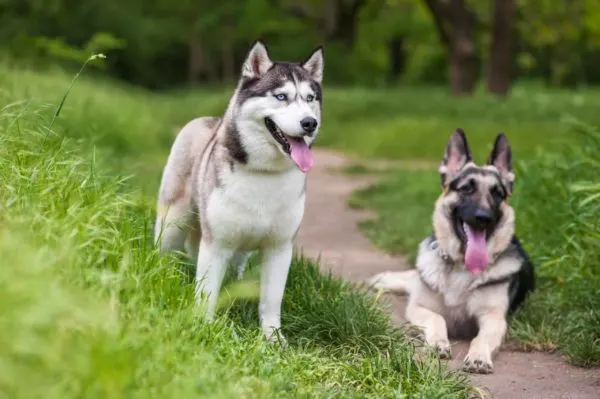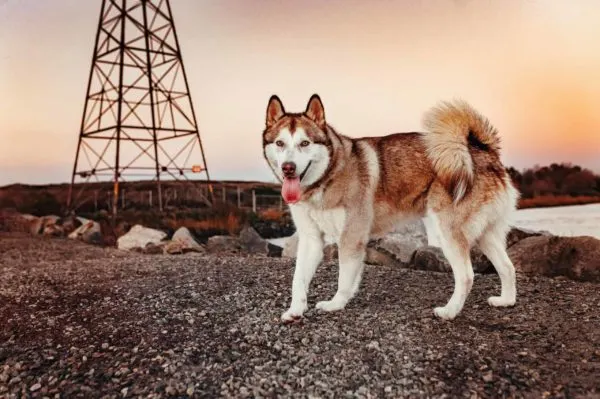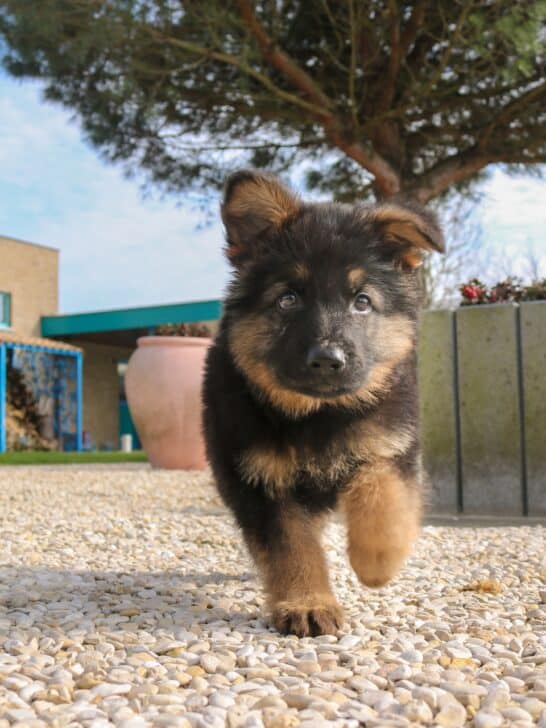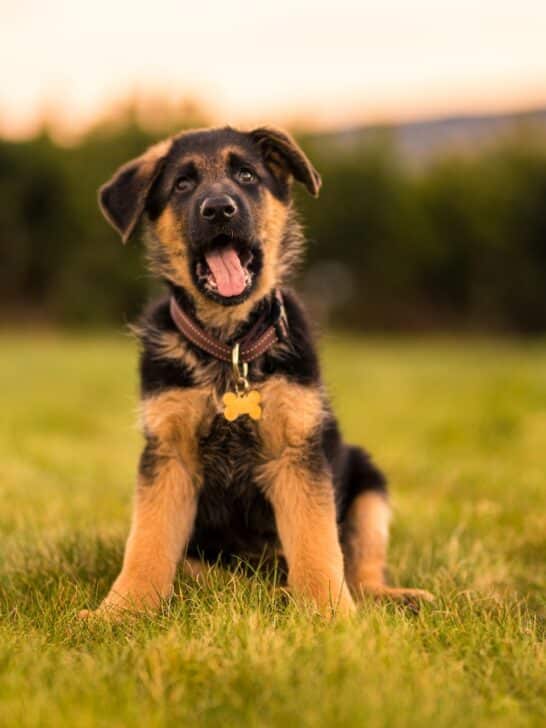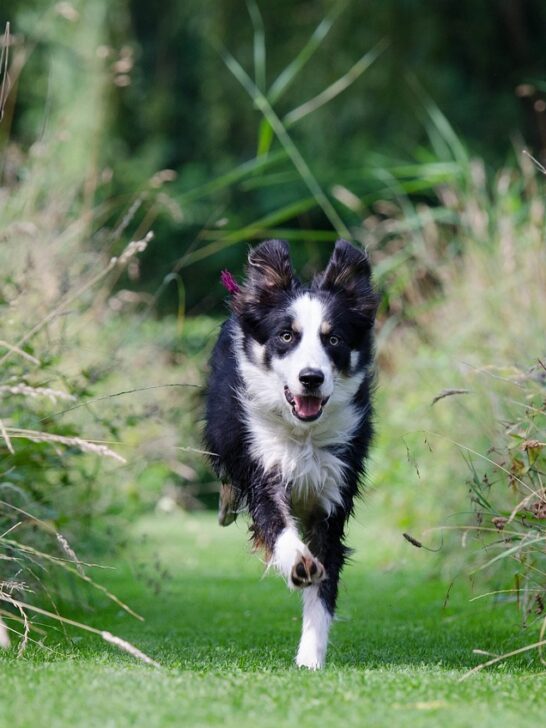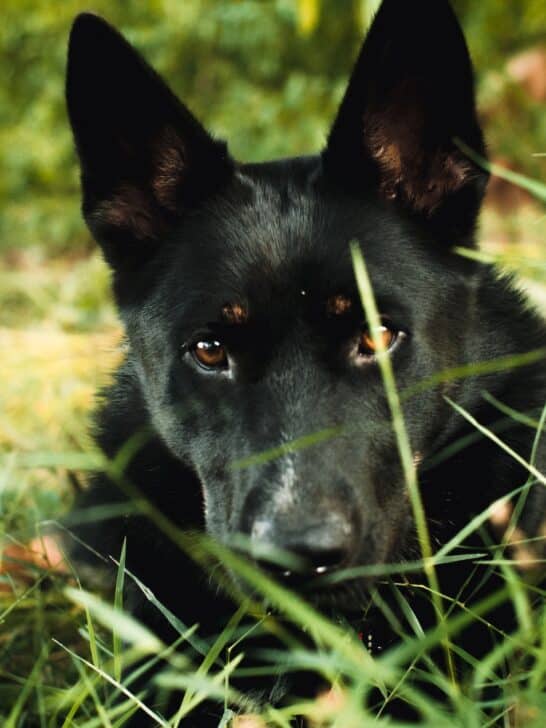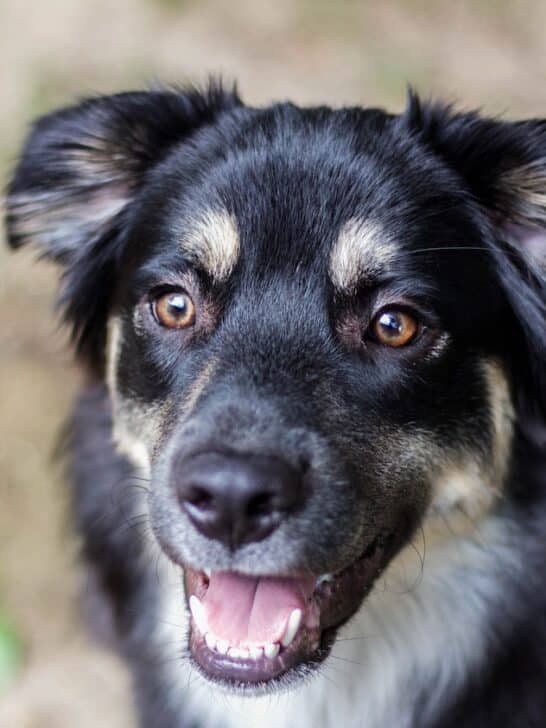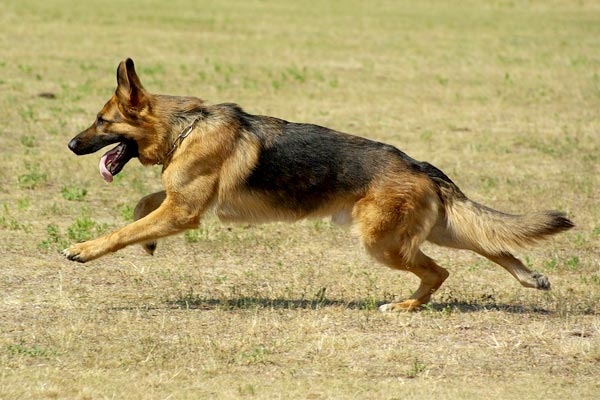How to Train a German Shepherd Husky Mix Puppy: What These Active Pups Really Need
The combination of the German Shepherd with the Husky is carefully designed to deliver a dog with the best traits of both purebred dog breeds.
Breeders and owners often call the German Shepherd Husky mix dog a Shepador or a Gerberian Shepsky (when the Husky parent dog is a Siberian Husky).
But what even the most enthusiastic first-time owners often are not prepared for is the initial training and direction these active pups require.
In this article, learn the steps to successfully train a German Shepherd Husky mix puppy.
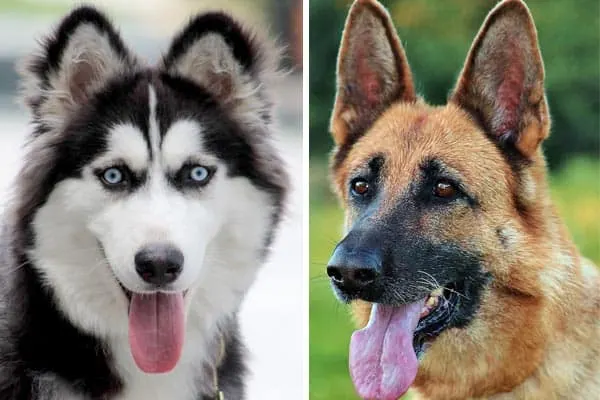
How to Train a German Shepherd Husky Mix Puppy?
Both the German Shepherd and Siberian Husky have some shared traits that can make early training a challenge.
For example, both dog breeds have a high prey drive and a high natural energy level. Both are also extremely intelligent and can be independent-minded (the Husky in particular).
This means you will need to use only positive reinforcement training methods.
Your training must include early and ongoing socialization with unfamiliar people and animals to help your dog learn how to be a part of a family and community.
See a German Shepherd Husky Mix Puppy in Training
In this owner-made YouTube video, you can watch a six-month-old German Shepherd Husky mix puppy showing off her training.
From this video, it is easy to see just how smart this hybrid dog breed truly is and also how well these dogs respond to positive reinforcement-based (praise-based) training methods.
While no dog alive today responds innately well to negative reinforcement (punishment-based) training, very intelligent and people-focused dog breeds like the GSD and the Husky may actively rebel unless they are given a lot of praise from their trainers.
What Is a Hybrid Dog Breed, Exactly?
A hybrid dog breed is a confusing topic in the world of modern dog breeding.
Some people think that crossing two purebred dog breed lines is simply a dilution of breed genetics that has taken generations to build.
Other people don’t quite understand the difference between a hybrid dog breed and a mixed breed dog, or mutt.
For our purposes in this article, a hybrid dog breed is a dog that has two different purebred dog parents.
In the case of the German Shepherd Husky mix puppy, those are the German Shepherd and the Siberian Husky, respectively.
What many people don’t realize is that dogs like the German Shepherd and the Siberian Husky were once hybrid dog breeds themselves.
Many different dogs were crossed to develop many of today’s beloved purebred dog breeds.
There are some definite benefits that can come from crossing purebred breed lines.
Among the most important are the health benefits that can come when adding genetic diversity to any breed line.
This is one of the primary reasons some breeders are pursuing hybrid dog breeding today.
Another common benefit, and the one that has prompted so many breeders to undertake to create a new dog breed, is the opportunity to combine desirable personality, temperament, and other traits together in a new dog breed.
However, in the early stages of developing a hybrid dog breed, in particular, there can be some unpredictability in terms of which traits a puppy will inherit from either purebred dog parent.
The Siberian Husky is best known for the trait of being a people-loving and intensely hard-working dog breed.
The German Shepherd dog is best known for its work ethic as a herding and livestock guarding dog and, later, a protection and military K-9.
A German Shepherd Husky mix is likely to inherit both of these desirable traits at least in part, which is a big part of this hybrid breed’s appeal.
Understanding the German Shepherd and Siberian Husky Personality and Temperament
As we mentioned briefly in a previous section here, a key to getting the most out of each training session with your German Shepherd Husky mix puppy is taking the time to first understand the personality and temperament of this unique hybrid dog breed.
German Shepherd dog breed personality and temperament
The German Shepherd dog persistently ranks just behind the Labrador Retriever as the second most popular purebred dog breed in America, according to the American Kennel Club (AKC).
This is despite the fact that the GSD, as many owners call this dog breed, is a particularly intense dog breed with a high prey drive and extremely strong guarding and protective instincts.
At face value, these definitely sound like assets to have in a companion canine.
But the truth is that the GSD is not the easiest dog to train and socialize with, especially if you are new to dog ownership and your GSD comes from a working breed line.
The German Shepherd is very bonded with their people and really needs to be at the center of home and family life. These dogs cannot tolerate being left alone – even in the company of other dogs.
German Shepherds were originally bred by a German Cavalry officer named Captain Max von Stephanitz to be the “perfect” working dog breed.
This means that the German Shepherd has a very high energy level and high activity needs.
So a German Shepherd puppy is going to need lots of daily activity and exercise along with early training and socialization to be able to get along in a community where encountering new people and animals will be a daily occurrence.
Siberian Husky dog breed personality and temperament
The Siberian Husky hails from a long line of sled dogs that were originally bred by the Chukchi people of Asia in incredibly cold and difficult weather conditions.
Today, the Siberian Husky is the 14th most popular companion canine breed (out of 195 American Kennel Club-registered dog breeds) in the United States.
These dogs are not well-suited to be guard dogs. They are accustomed to living in a pack situation with other Siberian Huskies and groups of people.
They are very social but also independent-minded as befits their job of pulling sleighs with a dog team.
This means a Siberian Husky puppy will need a different type of training and socialization to the German Shepherd.
For starters, unlike the German Shepherd, it is rare to find a Siberian Husky that can ever be let off-leash safely. Their instinct to run and run is simply too strong.
Tips to Train Your Siberian Husky German Shepherd Puppy
As Sarasota Dog points out, both the German Shepherd and the Siberian Husky can have a particularly strong prey drive.
This means the dog’s innate instinct to give chase to small prey can feel nearly irresistible to the dog.
When you breed two dogs that both have the same strong prey drive, the instinct will just become stronger in the puppies.
Managing the prey drive with proper training
The best way to manage such a strong prey drive in a German Shepherd Husky mix puppy is to start the day you bring your new puppy home by introducing them to new people and animals.
Your dog needs to learn right away how to tell the difference between a friend and a potential threat.
Your dog will take their cues from you, so by introducing your dog to friends and neutral unknown people, your puppy will learn how you act in non-threatening situations and start to learn the difference between a threat and a non-threat.
While this process is likely to feel less streamlined with the neighbor’s pet cat or that backyard squirrel, the earlier you can start training and socialization around other pet animals, the better for all concerned.
Managing intelligent stubbornness with proper training
The best way to manage independent intelligence (or intelligence stubbornness) in a German Shepherd Husky mix puppy is to always use positive reinforcement training methods and to be incredibly firm and consistent in those training methods.
Where new dog owners in particular often get confused is in the difference between the old “alpha pack member” training mentality and the new “positive reinforcement-based” training mentality.
These two do not have to be mutually exclusive. You can use positive reinforcement training and still assert that your dog must mind you at all times.
The key is to show your dog that you can be trusted to give consistent guidance every single day.
Managing a high energy level with proper training
The German Shepherd is considered a true large breed dog. These dogs can easily weigh anywhere from 50 to 90 pounds in adulthood, according to VetStreet.
And as VetStreet explains, the Siberian Husky falls into the medium to large dog breed category, with an average weight of between 35 and 60 pounds at maturity.
For large breed dogs, in particular, it is vitally important not to over-exercise them too early in life before the growth plates in the bones have closed and fused permanently.
Dogs that are given too much intense exercise, like long runs or hikes, too early in life may have irreversible bone, muscle, or ligament damage.
This can really be a problem when you are dealing with a naturally high-energy German Shepherd Husky puppy!
Your puppy will also be facing several difficult periods of growth, including teething, growing pains, and coat transition from puppyhood to adulthood.
The more activity you can provide, the less likely your puppy will be to burn off steam by chewing your household furniture or digging up your yard.
The key to helping your naturally energetic, active, and playful puppy safely burn off steam is to break training sessions up into several shorter interactive training sessions.
Try to use playtime as much as possible as a training reward for your dog to keep them moving but in short, safe spurts.
You could throw a ball and play fetch, do a tug-of-war session, play an interactive puzzle game, or even offer a puzzle feeder or snuffle mat that contains treats to give your dog something to do to burn up that energy.
Your goal at day’s end is to have a consistently well-trained and well-socialized puppy that is also completely exhausted and eager to fall asleep soundly.
Understand the Limits of Any Dog Training for a German Shepherd Husky Mix
As Canine Weekly explains, the goal of a high-quality positive reinforcement-based training program is to help your dog feel confident living life in a family and community.
It is not to train the innate character, personality, and temperament traits of your dog.
You can count on your puppy having a strong prey drive, a love of running and chasing, some level of protective instinct, and a need to be with you for the majority of each day.
How much of each trait your German Shepherd Husky mix puppy dog inherits can be hard to predict, especially in breeding programs that cross two purebred dogs, versus two-hybrid breed dogs.
Because of this, you will need to plan for everything.
For example, you will need to provide your dog with an escape-proof yard (this includes digging, climbing, and jumping) since the German Shepherd Husky mix is known to be an accomplished escape artist.
You will also need to take as much time training kids how to interact with your German Shepherd Husky mix as you will in training your dog to do the same.
Finally, the more you can do to provide your Shepador with a daily job, the happier and more well-adjusted your dog is likely to be.
These dogs can make incredible canine athletes and excel in all types of canine sports, from agility to dock diving, obedience/rally to search and rescue, service, and therapy dog work.
A well-trained Shepador is more likely to be a confident and happy Shepador who is a joy to live with.














